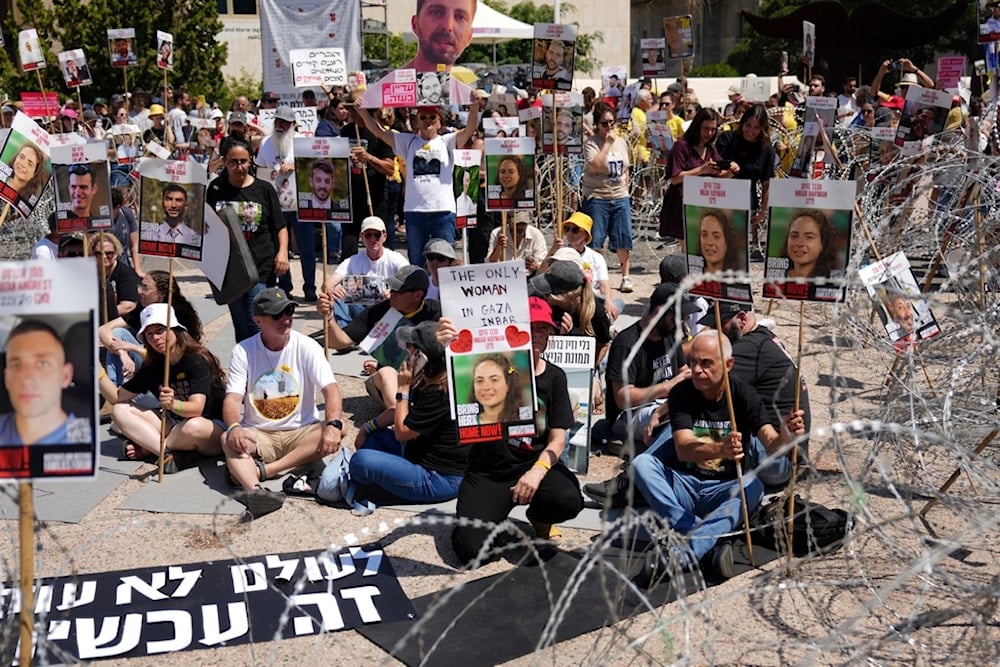Israeli protesters block Tel Aviv highway over Gaza captives crisis
Videos of starving Israeli captives in Gaza spark outrage as protesters block the Tel Aviv highway, demanding urgent action from the government to secure their release.
-

Families of captives protest, demanding the release from the Gaza Strip, at the plaza known as the Hostages Square in Tel Aviv, occupied Palestine, Saturday, Aug. 2, 2025 (AP)
Dozens of demonstrators blocked traffic on the Ayalon Highway early Sunday, demanding the urgent release of captives held in Gaza after the Resistance published footage of two emaciated Israeli captives, drawing alarm and reigniting public pressure on the Israeli government.
The protest, organized by the Women’s Protest group and joined by relatives of previously released captives, unfolded on the Jewish day of mourning, Tisha B’Av. The symbolism was deliberate: banners read “Abandonment of the hostages = destruction of the Third Temple,” and chants of “Why are they still in Gaza?” echoed across the highway. Others carried signs in English, such as “Never again is now” and “Everyone in a deal. Get out of Gaza.”
Among the demonstrators were Shai Mozes and Meor Rosenberg, relatives of the returned captives Gadi Mozes and Arbel Yehoud. The protest lasted around 20 minutes, according to Haaretz, before police cleared the highway.
Emaciated Israeli captives
The anger comes after Hamas and Islamic Jihad released separate videos of captives Evyatar David and Rom Braslavsky, both visibly starved due to the Israeli blockade on Gaza. One video showed David digging his own grave, with bones protruding from his frame, an image that has sent shockwaves through Israeli society.
“This morning is the Ninth of Av, and the greatest destruction has only been getting deeper for 667 days,” said a statement from protesters, referencing the period since the October 7, 2023 attack that launched the war. They blamed Netanyahu's government for abandoning the captives, accusing officials of failing to secure their release through negotiations.
“It is impossible to breathe in the face of the pictures of Evyatar David and Rom Braslavsky,” the statement continued. “Bring everyone back, the living and the dead, and end the war already.”
Limited international reactions
International reactions to the videos have so far been limited. EU foreign policy chief Kaja Kallas said the footage was “appalling” and called for the immediate release of all captives, while reiterating support for humanitarian aid into Gaza. “Hamas must disarm and end its rule in Gaza,” she posted on X.
US President Donald Trump was also briefed on the video of David, according to Ynet, while Senator John Fetterman condemned Hamas, writing, “I cannot even begin to imagine the horror of this video for [David’s] family… Send these poor souls home, disarm, and end this hell on earth in Gaza.”
On Saturday night, thousands gathered again at Tel Aviv’s Hostages Square, where family members of the two captives spoke out. David’s family warned he has “only a few days left to live,” calling on both “Israel” and the international community to intervene.
“Hamas is using our son Evyatar as a live experiment in human starvation,” the family said.
Captives dropping one by one
David, who appeared in a prior Hamas video in February, was reportedly in poor health even then. Islamic Jihad, for its part, claimed over a week ago that it had lost contact with the unit holding Braslavsky, saying the new video was recorded earlier.
Tal Shoham, a former captive who was held alongside David, confirmed in a video statement that Hamas had adequate food supplies but was deliberately starving captives for propaganda purposes. “David is under really extreme life-threatening danger right now,” Shoham said.
In a column for Ynet, former captive Ohad Ben-Ami said the starvation seen in the recent videos echoed his own experience. “When I returned from captivity, my body had only 3.5% body fat… Evyatar and Rom may be in this situation as well,” he wrote. “The negotiations need to be quick, so we can save them.”

 4 Min Read
4 Min Read










